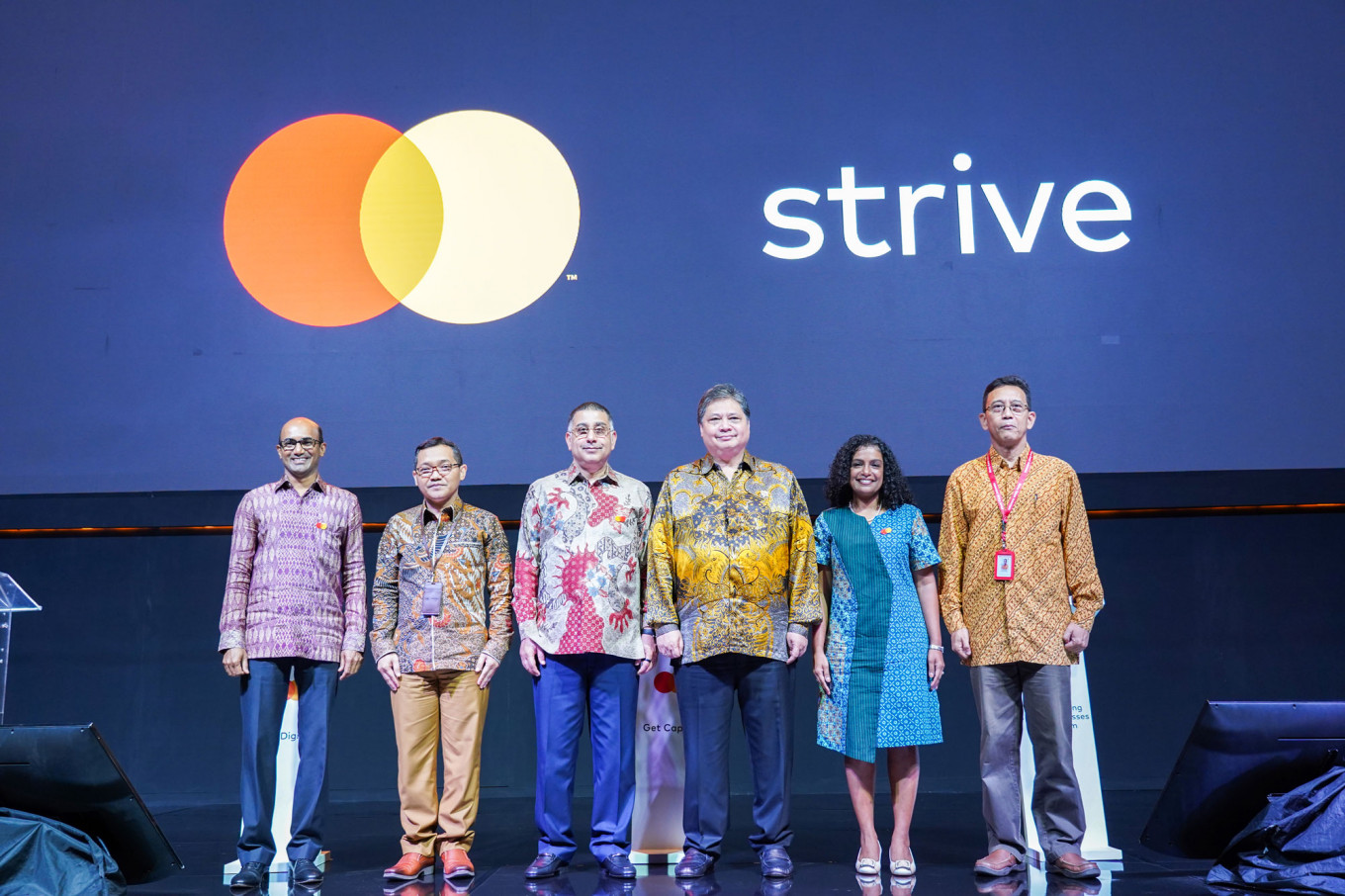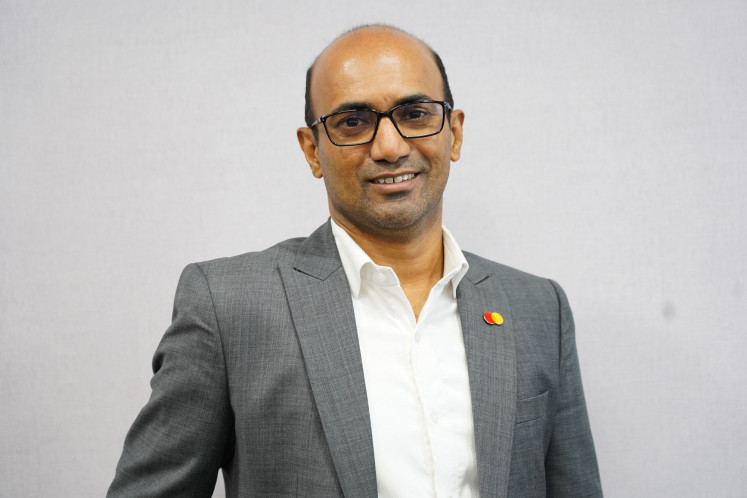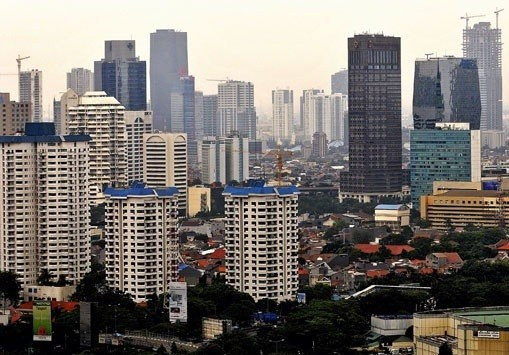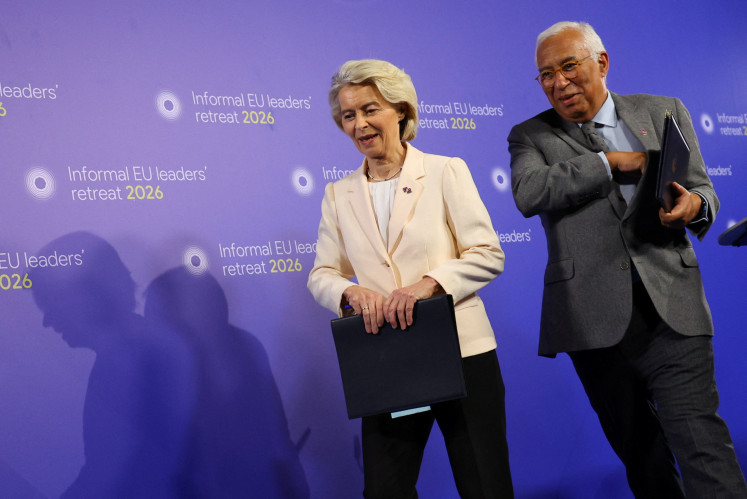Popular Reads
Top Results
Can't find what you're looking for?
View all search resultsPopular Reads
Top Results
Can't find what you're looking for?
View all search resultsMastercard launches Strive Indonesia to boost financial and digital inclusion for MSMEs
Commemorating International MSMEs day, Navin Jain, President Director of PT Mastercard Indonesia, spoke to The Jakarta Post on Mastercard’s insights regarding MSMEs in Indonesia, the challenges they face and how Mastercard plans to empower these local businesses.
Change text size
Gift Premium Articles
to Anyone
 (Left to right) Navin Jain, President Director, PT Mastercard Indonesia; Ferry Irawan, Acting Deputy for Coordinating Macroeconomics and Finance of the Coordinating Ministry for Economic Affairs; Safdar Khan, Division President, Southeast Asia, Mastercard; Airlangga Hartarto, Coordinating Minister for Economic Affairs of Indonesia; Subhashini Chandran, Vice President, Social Impact, Asia Pacific, Mastercard Center for Inclusive Growth; dan Ade Soekadis, Executive Director of Mercy Corps Indonesia during the Mastercard Strive Indonesia launch on 4 April 2023.
(Left to right) Navin Jain, President Director, PT Mastercard Indonesia; Ferry Irawan, Acting Deputy for Coordinating Macroeconomics and Finance of the Coordinating Ministry for Economic Affairs; Safdar Khan, Division President, Southeast Asia, Mastercard; Airlangga Hartarto, Coordinating Minister for Economic Affairs of Indonesia; Subhashini Chandran, Vice President, Social Impact, Asia Pacific, Mastercard Center for Inclusive Growth; dan Ade Soekadis, Executive Director of Mercy Corps Indonesia during the Mastercard Strive Indonesia launch on 4 April 2023.
I
n Indonesia, micro, small and medium-sized enterprises (MSMEs) play a critical role in the country’s economy, contributing to around 61 percent of its gross domestic product (GDP) and creating approximately 97 percent of Indonesia’s domestic employment 1, making them the backbone of the country’s economy.
Commemorating International MSMEs day, Navin Jain, President Director, PT Mastercard Indonesia, spoke to The Jakarta Post on Mastercard’s insights regarding MSMEs in Indonesia, the challenges they face and how Mastercard plans to empower these local businesses.
Question: Despite their importance to the economy, Indonesian MSMEs face a host of challenges when it comes to digitalization. Can you share insights into what those challenges are?
Answer: The problems MSMEs face are numerous: they have limited access to capital, there is lack of digital infrastructure, and they have limited formal knowledge and skills.
Many small businesses in the country lack financing or funds, making it difficult for them to invest in new equipment, hire additional staff and expand their operations. They also need access to reliable internet connectivity, something that is not equally distributed within the country, which limits their ability to use online platforms for marketing their products and reaching new customers. Furthermore, numerous businesses lack formal business training and skills, hindering their ability to properly manage finances, market their business and compete effectively.
So far, only 22 million MSMEs have entered the digital ecosystem (accounting for just 34% of the MSME population), 18 million need access to formal financing and over 45 million 2 small businesses require additional funding for business capital and investment. These challenges exacerbate the difficulties faced by MSMEs in Indonesia, hindering their access to the digital economy and financial services, and stunting their growth potential.
Because of this, Mastercard is launching its Strive program in Indonesia, to support small businesses in financial and digital inclusion so that they can thrive, create more jobs and drive the economic growth of Indonesia.
Question: What is the role of technology in helping Indonesian MSMEs in future-proofing themselves and recover from the pandemic?
Answer: In this digital era, technology plays a crucial role in enhancing business growth, productivity and workflow. The pandemic has shown the importance of going digital, especially for small businesses. Beyond necessity, digitalization can also help small businesses save costs and increase productivity. With technology and digitization, MSMEs can increase their brand awareness, improve their security, and provide advanced and diverse payment options. Through leveraging modern technology, brands can improve their exposure, small businesses can reach customers beyond their physical location, expand their customer base and increase revenue streams. By using e-commerce platforms, small businesses can sell their products or services online and facilitate contactless transactions that reduce the need for physical interactions.
Additionally, modern technology can help enhance the security of small businesses. For instance, with Mastercard’s solutions such as RiskRecon, Ekata and NuData, small enterprises can detect and protect themselves from cybersecurity threats like data breaches and online fraud, which are severely damaging to both their brand and operations. Multi-layer security such as Mastercard’s tokenization, which replaces a card’s primary account number (PAN) with a unique alternate card number or “token”, can help small businesses protect their data and online transactions even more.
Lastly, if MSMEs utilize modern technology, they can provide multiple payment options, such as virtual credit or debit cards, digital wallets and buy now pay later (PNPL) for their customers to ensure a secure and hassle-free checkout experience. Digital payment solutions like these and QR code payments enable small businesses to accept contactless payments, and at the same time bring consumers more choices in the way they want to pay. This is increasingly important as consumers’ lifestyles have changed tremendously in today’s digital-first world, and businesses need to cater to their preferences in order to attract and retain customers. Additionally, digital payments also provide enterprises with more efficient and secure ways to track and manage their cash flow.
Navin Jain, President Director, PT Mastercard IndonesiaAt Mastercard, we believe that technology is a powerful tool to boost financial inclusion, empower small businesses, and enable a cycle of long-term wealth. Directed in the right way, technology can be a force for good. But not all small businesses know how to make the best use of technology and go digital.
This is why Mastercard is launching Mastercard Strive Indonesia, introducing this initiative to help 300,000 small businesses utilize technology resources to digitize their operations, streamline financial and back-office services, and improve market access to ensure they succeed in our modern economy. The program is designed to build demand for digitalization and lower barriers to adoption to enable small businesses to tap into the power of digital technology to build resilience and growth.
At Mastercard, we see a digitally inclusive society as one where all individuals and businesses have equal access to technologies, services, and the skills needed to participate and benefit from today’s digital opportunities. As the digital economy increasingly becomes the economy, it is both our business strategy and our social responsibility to ensure that people and organizations have access to the networks, tools and solutions that can help them reach their potential and achieve financial security.
Question: During the pandemic, many businesses found a lifeline by selling online. But many small businesses still require help in finding support or resources to make the jump. How can this new initiative help close the gap for MSMEs and support them in going online?
Answer: Mastercard Strive Indonesia was built on the success of our previous program, Mastercard Academy 2.0, which helped drive the digitalization of Indonesian MSMEs and offered bespoke support, especially for women entrepreneurs.
As the same time, Mastercard Strive Indonesia also draws on our learnings and experience across our portfolio of philanthropic programs supported by the Mastercard Center for Inclusive Growth. Collectively, these programs aim to provide support to more than 10 million small businesses globally.
Strive’s approach combines technology and touch to achieve scale, while maintaining the deep impact of the program – and this is what sets the program apart. This program in Indonesia is expected to provide a significant impact by helping 300,000 Indonesian small businesses, supporting them to succeed in an increasingly competitive digital economy.
Through Mastercard Strive Indonesia, we are focused on achieving three goals: going digital by growing networks and know-hows, getting capital, and strengthening the support ecosystem of small businesses. We want to build demand and lower the barriers of entry to technology adaptation through peer mentoring that addresses the costs of digitalization. We are also working closely with bank and non-bank institutions to further democratize access to credit for small businesses, especially for women-led or -owned businesses. Finally, by establishing a learning network and conducting research on small business digitization in order to share the best practices and insights, co-create initiatives to address systemic bottlenecks, and provide an ecosystem with rich quantitative data, we can trigger positive shifts that will reinforce the support toward small businesses.
Question: Aside from Mastercard Strive Indonesia, what other initiatives has Mastercard done to empower small businesses in Indonesia?
Answer: We have been collaborating with key public and private sector players, alongside non-profit organizations, to roll out programs and solutions that can accelerate individuals and businesses’ access to financial products and digital solutions. Since 2017, Mastercard has supported over 280,000 entrepreneurs, 68,000 students, and 72,000 individuals in Indonesia through various types of social impact.
In 2019, Mastercard and Bank Commonwealth launched MicroMentor Indonesia (MMI), a collaboration between Mastercard and Mercy Corps Indonesia under our Mastercard Academy 2.0 program. This initiative was supported by the Cooperatives and Small and Medium Enterprises Ministry, and it is a digital mentoring platform that connects small businesses with business mentoring and cybersecurity training. Since its inception, the program has reached over 187,000 small businesses and 27,000 volunteer mentors in Indonesia. Around 87 percent of the participating small businesses in MMI reported an improved quality of life after gaining new knowledge and skills, business growth and network expansion after joining the program.
We also recently collaborated with the YCAB Foundation, Bank Rakyat Indonesia (BRI), Grab and PT Hotel Indonesia Natour (HIN) to empower 100 small enterprises in Labuan Bajo and East Nusa Tenggara by providing a training program. This program focuses on teaching English and product-branding capabilities, benefitting MSMEs in the city and equipping them with the skills to improve their business outcomes. Based on our data, this program has a satisfaction score of 98 percent.
Aside from that, Mastercard has also partnered with Grab to launch the Small Business, Big Dreams regional program to upskill gig economy workers and small businesses in three markets in Southeast Asia, which includes Indonesia. As of March 2023, the program has reached over 75,000 merchants within the Grab ecosystem in Indonesia.
Lastly, in 2022, we released “Empowering Small and Medium-sized Business Growth by Unleashing Their Data” – a comprehensive report that discusses the key technology solutions that can help remove the biggest barriers faced by MSMEs. The report explores digital vulnerabilities that come with small business growth and the need for partners that can help them better tackle these threats. The top areas where small business owners are open to exploring new solutions include cybersecurity, data analytics and inventory management.
Question: What is Mastercard's long-term vision for supporting Indonesian MSMEs?
Globally, we are committed to bringing a total of 1 billion people and 50 million small businesses into the digital economy by 2025. In 2022, we collaborated with our partners to connect over 100 million people and 9 million small businesses globally to the digital economy. Since 2015, with partners, we have connected more than 780 million people and 35 million small businesses globally to the digital economy.
As part of our global commitment, we have a specific focus on empowering 25 million women entrepreneurs by providing them with business growth solutions. In 2022, we supported 8 million women entrepreneurs with these solutions, and since 2020, we have surpassed our goal by supporting 27 million women entrepreneurs worldwide..
In Indonesia, Mastercard has made significant investments over the past three decades and has been agile and active in building a digitally and financially inclusive society that works for everyone. We are committed to supporting Indonesian small businesses in the long term, and the launch of the Mastercard Strive Indonesia program is just one part of this commitment.
We’ve seen that out of a total of 64 million MSMEs in Indonesia 3, only about 22 million of them have entered the digital ecosystem. So while we’ve witnessed a significant, secular move to digital, there is still room for many more to join in.
We want to narrow this digital divide, and this includes addressing the needs of the most vulnerable small business populations and leveling the playing field for them. Through continued investment in small businesses and strategic partnerships with key stakeholders to provide training, resources, financial services and technological access, we can help small businesses grow, thereby driving digital and financial inclusion. These partnerships will also strengthen Mastercard’s commitment in supporting the government's effort to help 30 million MSMEs transition into the digital ecosystem by 2024.
When small businesses thrive, our local communities and economies thrive. By working together, we can help strengthen small businesses, empower them for a digital future and unleash their full potential to advance inclusive economic growth.
This article in partnership with Mastercard











